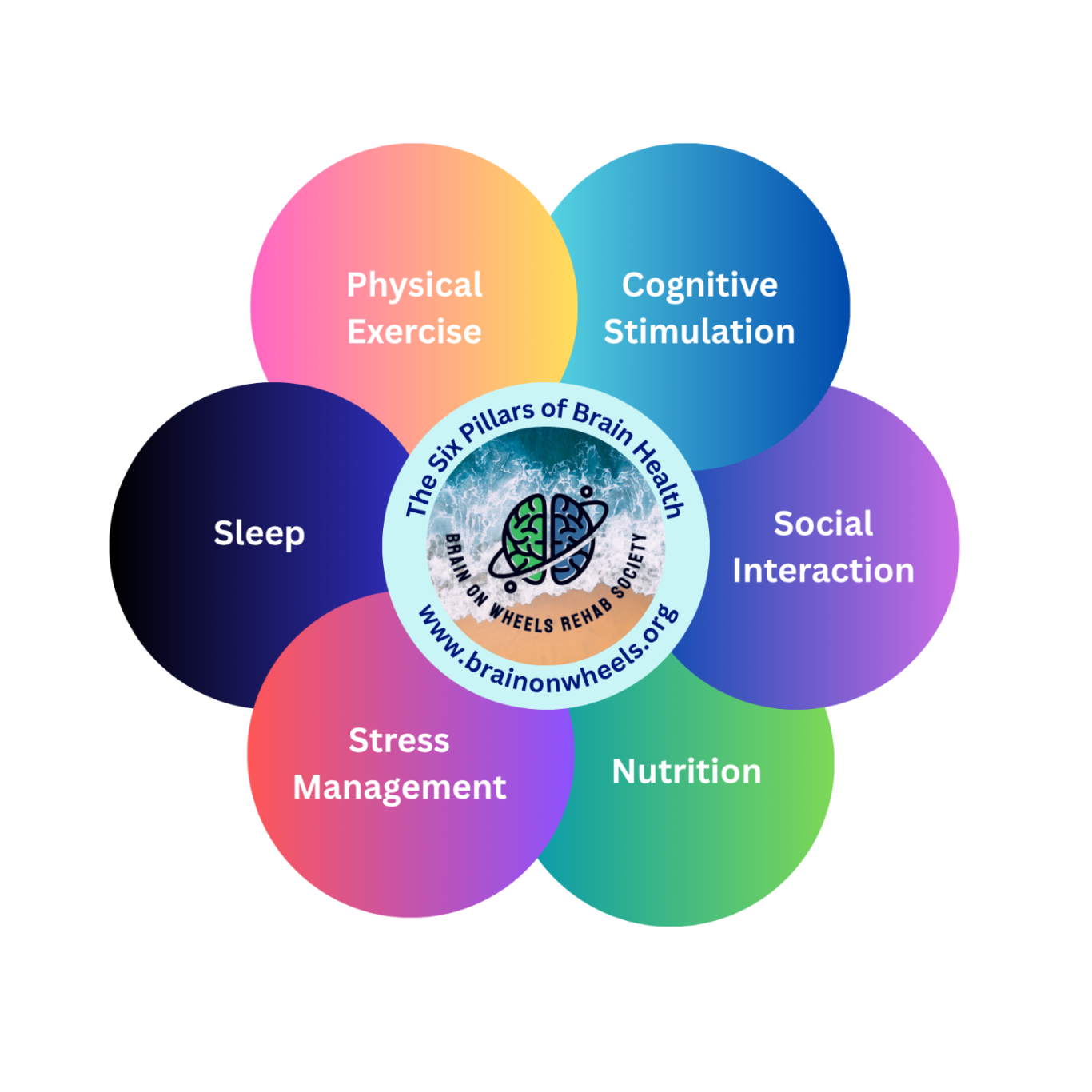
Brain Health Pillar 1 - Sleep
Unlocking the Power of Sleep for a Healthier Brain
At Brain on Wheels Rehab Society, we understand that sleep is not just a time to rest; it is a critical component of maintaining optimal brain health. Quality sleep is essential for concentration and cognitive functioning, impacting everything from memory retention to stress management. In this section, we will explore the significance of sleep, how it affects your cognitive abilities, and share practical tips on improving your sleep hygiene to enhance your brain performance.

Why Sleep Matters for Brain Health
Sleep: The Brain's Best Friend!
Research has consistently shown that sleep plays a vital role in our cognitive functions. During sleep, the brain processes information, consolidates memories, and rejuvenates itself. Good sleep contributes to improved focus, problem-solving skills, and emotional well-being. Without adequate sleep, cognitive functions can suffer, impairing your ability to think clearly and make decisions.

The Consequences of Sleep Deprivation
Don't Let Sleep Loss Hold You Back!
Lack of sleep can have a profound impact on your mental faculties. Inadequate rest not only decreases memory retention but also increases stress levels, contributing to a cycle of poor cognitive performance. Over time, chronic sleep deprivation can lead to serious health issues, including anxiety, depression, and diminished brain function. It's essential to address sleep quality to protect your mental clarity.

Tips for Improving Sleep Hygiene
Enhance Your Sleep for Better Brain Performance!
To maximize the benefits of sleep, adopting good sleep hygiene practices is crucial. Here are some tips to help you improve your sleep quality: establish a regular sleep schedule, create a restful sleeping environment, and limit screen time before bed. Additionally, engaging in relaxation techniques such as meditation or deep breathing can also facilitate better sleep.

Explore More About Sleep Science
Dive Deeper into the Importance of Sleep!
For those interested in the science behind sleep, numerous studies delve into its effects on cognitive health. Organizations and researchers are constantly discovering how sleep affects brain chemistry and structure. We encourage you to explore this fascinating field and understand how important prioritizing sleep can be for your overall well-being.
Brain Health Pillar 2 - Physical Exercise
Physical Activity is Foundational for Brain Health
At Brain on Wheels Rehab Society, we emphasize the importance of physical exercise as a key component for improving brain health. Regular physical activity not only enhances physical strength but also significantly contributes to mental clarity and cognitive function. We advocate for creativity to integrate movement into everyday routines. Experience the transformative benefits of exercise and join our mission to enhance your mental and emotional well-being.

Empowering Your Mind Through Movement
Boost Brain Power!
Exercise increases blood flow and oxygen to the brain, which is vital for maintaining healthy brain cells and supporting their functions. This can enhance cognitive abilities such as problem-solving, concentration, and memory. Studies have shown that physically active individuals tend to have a larger hippocampus, the part of the brain involved in memory and learning. Simple activities like walking or cycling can have significant benefits.
Actionable tips:
Incorporate aerobic exercises like running or swimming to maximize oxygen flow and use technology, like fitness apps, to track your progress and stay motivated.

Reduce Stress and Anxiety
Finding Calm
When you exercise, your body releases endorphins, which are chemicals in the brain that act as natural painkillers and mood elevators. Regular physical activity can also lower levels of stress hormones such as adrenaline and cortisol, promoting a more relaxed state of mind and reducing the risk of developing anxiety disorders.
Actionable steps:
Practice breathing exercises during workouts to enhance relaxation and set achievable fitness goals to build confidence and reduce stress.

Supports Brain Plasticity
Movement Matters!
Exercise stimulates the production of growth factors in the brain, which are proteins that help create new neuronal connections. This is crucial for neuroplasticity—the brain's ability to change and adapt as a result of experience. Engaging in varied physical activities can challenge your brain and enhance its adaptability.
Actionable steps:
Try cross-training to expose your brain to diverse physical demands and incorporate balance and coordination exercises to further engage your brain.

Enhances Mood and Sleep Quality
The Connection between body and brain!
Physical activity can lead to improvements in mood through the release of endorphins and other mood-enhancing chemicals. It can also help regulate circadian rhythms, leading to better sleep quality. A consistent exercise routine can reduce symptoms of insomnia and other sleep disorders.
Actionable tips:
Develop a pre-sleep routine that includes light stretching or meditation and monitor your sleep patterns to identify how exercise affects your rest.
Brain Health Pillar 3 - Cognitive Stimulation
Cognitive Stimulation is a Fundamental Pillar of Brain Health
At Brain on Wheels Rehab Society, we believe that nutrition plays an impactful role in maintaining optimal brain health. A balanced diet provides essential nutrients that support cognitive function, enhance mood, and protect against neurological decline. By focusing on nutrient-rich foods, we empower individuals to make informed choices that positively affect their mental well-being.

Neuroplasticity Enhancement
Flex Your Brain's Muscles: Unlock the Power of Neuroplasticity!
Cognitive stimulation plays a crucial role in enhancing neuroplasticity, the brain's remarkable ability to reorganize itself by forming new neural connections. This adaptability is vital for learning and memory, as it allows the brain to recover from injury and adjust to new experiences or changes in the environment.

Memory and Learning
Boost Your Brain's Library: Enhance Memory and Learning!
Engaging in cognitive activities strengthens the neural networks involved in memory and learning. Regular mental challenges can improve the brain's capacity to store and retrieve information, leading to better memory retention and recall. This is critical for both academic and everyday cognitive tasks, ensuring that individuals can efficiently process and utilize information.

Cognitive Reserve Building
Build Your Brain's Safety Net: Strengthen Your Cognitive Reserve!
Cognitive reserve refers to the brain's ability to improvise and find alternative ways of getting a job done. Cognitive stimulation helps build this reserve, providing a buffer against cognitive decline associated with aging or neurodegenerative diseases. A robust cognitive reserve can help maintain cognitive functions even when the brain undergoes age-related changes.

Emotional and Psychological Benefits
Elevate Your Mind and Mood: Thrive with Cognitive Challenges!
Beyond cognitive advantages, mental stimulation contributes to emotional well-being by providing a sense of achievement and purpose. Engaging in challenging yet rewarding activities can boost self-esteem and reduce the risk of anxiety and depression. The positive feedback from mastering new skills or solving complex problems enhances mood and overall life satisfaction.
Brain Health Pillar 4 - Nutrition
Nutrition Plays a Vital Role in Maintaining a Healthy Brain
At Brain on Wheels Rehab Society, we believe that nutrition plays an impactful role in maintaining optimal brain health. A balanced diet provides essential nutrients that support cognitive function, enhance mood, and protect against neurological decline. By focusing on nutrient-rich foods, we empower individuals to make informed choices that positively affect their mental well-being.

The Power of Nutrition in Cognitive Function
Fueling Your Brain for Success!
At Brain on Wheels Rehab Society, emphasize the importance of incorporating a variety of whole foods into your daily diet. Foods rich in omega-3 fatty acids, antioxidants, and B vitamins are particularly beneficial for enhancing memory and concentration. A diet abundant in fruits, vegetables, and healthy fats can contribute to a sharper mind and increased productivity.

Mindful Eating: A Gateway to Mental Wellness
Creating a Healthy Relationship with Food!
Nutrition is not just about what we eat but how we approach food. We encourage mindful eating practices that foster a deeper awareness of our nutritional choices. By slowing down and savoring each bite, individuals can cultivate a healthy relationship with food, reducing stress and promoting overall well-being.

Brain-Boosting Foods to Incorporate
Eating for Enhanced Mental Clarity!
In our efforts to support brain health, we recommend foods that are known for their cognitive benefits. Incorporate options such as fatty fish, leafy greens, berries, nuts, and whole grains into your meals. Each of these foods offers unique advantages, from reducing inflammation to boosting memory retention, ultimately leading to impactful improvements in brain function.

Join Us in Elevating Brain Health through Nutrition
Become Part of the Brain on Wheels Community!
At Brain on Wheels Rehab Society, we invite you to join our brain health programs, where nutrition is a fundamental pillar of our approach to brain health. Together, we can make impactful changes in our lives by prioritizing nutrition, sharing knowledge, and supporting one another on our journey to improved mental wellness.
Brain Health Pillar 5 - Stress Management
Calm Your Mind, Empower Your Life: Master Stress for Optimal Brain Health
Stress management is a vital pillar of brain health, as chronic stress can have detrimental effects on cognitive function and emotional well-being. The brain is particularly vulnerable to stress, which can impair memory, decision-making, and even lead to mental health disorders. By effectively managing stress, individuals can protect their brain's health, enhance resilience, and improve overall quality of life.

Cognitive Function Preservation
Guard Your Mental Sharpness: Preserve Cognitive Function Through Stress Management!
Chronic stress can negatively impact cognitive functions such as attention, memory, and processing speed. Prolonged exposure to stress hormones like cortisol can damage brain cells, particularly in areas related to memory and learning. By managing stress, individuals can maintain their cognitive abilities and prevent these adverse effects.

Emotional Resilience Enhancement
Fortify Your Emotional Armor: Boost Resilience with Stress Management!
Effective stress management enhances emotional resilience, helping individuals to cope better with life's challenges. It stabilizes mood and reduces the risk of anxiety and depression, empowering people to navigate through difficult situations with a positive outlook.

Physical Health Improvement
Strengthen Mind and Body: Improve Physical Health by Managing Stress!
Stress management is not only beneficial for mental health but also for physical well-being. Chronic stress can lead to a host of physical health issues, including heart disease, hypertension, and a weakened immune system. By reducing stress, individuals can lower their risk of these conditions and promote overall health.

Quality of Life Enhancement
Live Fully and Freely: Enhance Life Quality with Stress Management!
Managing stress effectively can significantly improve one's quality of life. Reduced stress leads to better sleep, more energy, and a greater sense of well-being. It allows individuals to enjoy life more fully, fostering a balanced and fulfilling lifestyle.
Brain Health Pillar 6 - Social Interaction
Connect, Thrive, and Flourish: Harness the Power of Social Bonds for Brain Health
Social interaction is a vital pillar of brain health, emphasizing the importance of building and maintaining meaningful relationships. Engaging socially is not only crucial for emotional well-being but also plays a significant role in cognitive health. Through social connections, individuals can experience a sense of belonging, share experiences, and stimulate their minds in a way solitary activities cannot.

Cognitive Engagement
Keep Your Mind Active: Boost Cognitive Health Through Social Interaction!
Social interactions often involve communication, problem-solving, and the exchange of ideas, which naturally stimulate cognitive processes. Engaging with others helps keep the brain active, promoting mental agility and reducing the risk of cognitive decline.

Emotional Support and Resilience
Build Your Emotional Safety Net: Gain Strength from Social Bonds!
Social connections provide a vital support network, helping individuals cope with stress and life's challenges. Having friends and family to turn to increases resilience and emotional stability, contributing to a more balanced mental state.

Longevity and Overall Well-being
Live Longer, Live Happier: Achieve Longevity with Social Connections!
Studies have shown that strong social ties are linked to longer lifespans and improved quality of life. Interacting with others can lead to healthier lifestyle choices and provides a buffer against illnesses, enhancing overall well-being.

Reduced Risk of Depression and Anxiety
Find Joy in Connection: Reduce Anxiety and Depression with Social Interaction!
Regular social interaction can significantly reduce the risk of depression and anxiety. Engaging in meaningful relationships provides emotional fulfillment, combats loneliness, and promotes a positive mood, fostering mental health.
